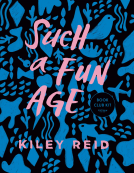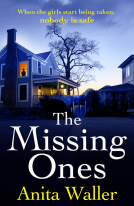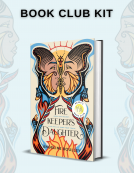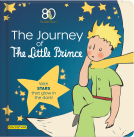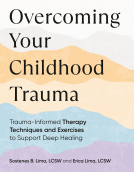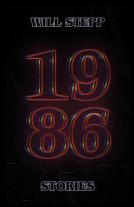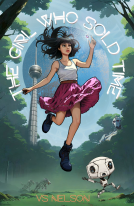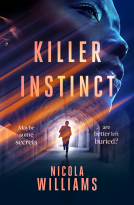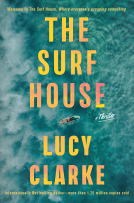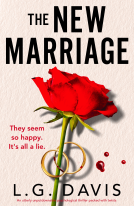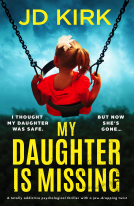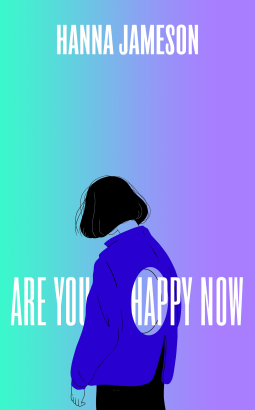
Are You Happy Now
'One of the best novels of 2023' Sara Collins
by Hanna Jameson
This title was previously available on NetGalley and is now archived.
Send NetGalley books directly to your Kindle or Kindle app
1
To read on a Kindle or Kindle app, please add kindle@netgalley.com as an approved email address to receive files in your Amazon account. Click here for step-by-step instructions.
2
Also find your Kindle email address within your Amazon account, and enter it here.
Pub Date Feb 02 2023 | Archive Date Feb 09 2023
Talking about this book? Use #AreYouHappyNow #NetGalley. More hashtag tips!
Description
'Jameson channels the righteous anger of a generation' Luzia Sauma
'An eerie, fascinating, nihilistic triumph' Heather Darwent
-----
A New York City wedding. Two great love stories. The beginning of a breaking world.
Yun and Emory fall into an intense romance, and then don't let go.
Andrew is clinging to his marriage, but knows he's lying to himself.
Fin can't resist ruining things, until he meets the right person.
But on that night, the world shifts in an impossible way. One of the wedding guests suddenly sits down and never gets back up. Soon people are doing it all across the world. Is it a choice - or an illness?
Can anyone be happy in a world where the only choice is to feel everything - or nothing at all?
An intensely compulsive novel for anyone who has ever felt hopeful and helpless in one breath, ARE YOU HAPPY NOW is about how you keep living when the world is on fire. Perfect for fans of Emily John St. Mandel's Station Eleven, Kazuo Ishiguro's Never Let Me Go, Patricia Lockwood's Nobody is Talking About This and Naomi Alderman's The Power.
-----
Praise for Hanna Jameson:
'Such a brilliant concept, perfectly executed' Araminta Hall, Hidden Depths
'Furious and tender . . . cuts to the core of modern life' Jessica Moor, Keeper
'A compelling meditation on fear, hope, grief and the difficulty of imagining a future in a world in crisis' The Bookseller
'Yun, Emory, Andrew & Fin buried themselves into my heart' Nikki Smith, The Beach Party
'Extraordinary' Emily St John Mandel, Station Eleven
'One of those books you can't stop reading, but don't want to end' TM Logan, The Holiday
'Dark, compelling, original' CJ Tudor, The Burning Girls
'Compulsively readable' Daily Telegraph
Available Editions
| EDITION | Other Format |
| ISBN | 9780241515075 |
| PRICE | £14.99 (GBP) |
| PAGES | 352 |
Featured Reviews
4 ½ stars (rounded up because of andrew)
“That this was the trade-off. The price of happiness. In order to feel happy he had to feel everything.”
A quietly crushing yet devastatingly tender work scintillating with insight and emotional intelligence. With acuity and empathy Hanna Jameson presents her readers with a captivating narrative chronicling four people’s attempts at happiness despite a looming health crisis: more and more people are literally sitting down and seemingly giving up on life.
“He didn’t want to die, he just wanted to stop, to cease, sit down. Maybe just sleep, for a year or maybe forever.”
Even more so than in her previous novel, The Last, Jameson bypasses the usual apocalyptic storylines, as she grounds her quietly dystopic concept firmly into reality. There is a minimalism to Jameson’s alternate/what if reality that brought to mind the subdued yet ominous world-building of authors such Kazuo Ishiguro, Emily St. John Mandel, Ling Ma, whose works are often characterized by a faintly ominous atmosphere.
“Boy meets girl at a wedding and the world ends. The classic meetcute.”
The novel opens at a wedding reception in NY, on a hot summer night. At first, we principally follow Yun, who is 29 and for years has been trying to make a living as a musician. He meets and is taken by Emory, a journalist who exudes wit and confidence. Their meet-cute comes to an abrupt halt when one of the s sits down and refuses to get back up. As the weeks go by, and Yun and Emory’s attraction blossoms solidify into something more solid, rumors of more and more cases reach Emory’s ears, and she decides to publish an article on the matter. This goes viral and she receives a lot of backlash. The lack of information on the whys and hows of “psychogenic catatonia” contribute to people’s growing panic and an avalanche of misinformation leads many to believe that psychogenic catatonia is either the beginning of the end or that it only affects ‘weak’ young people. Although Yun and Emory’s relationship eventually see them adopting the rhythms and routines of a couple, their dynamic shifts. Yun’s depression runs deep, casting everything around him with gloom. His self-doubt sees him pushing away those who care for him, such as Emory, his best-friend Andrew, and his own family. Perpetually dogged by his own sense of inadequacy, his growing self-absorption, even if of the miserable and negative variety, soon affects his empathy and well-being.
“He wondered why he always seemed destined to be slightly too far ahead or too far behind his own life.”
Emory on the other hand attempts to help him but as the world around her becomes more and more weighed by bad news, she also struggles to make sense of everything that is going on and the gnawing guilt she feels towards her article. For all her attempts to make things work and his longing to be happy, content even, their relationship continues to fray.
“Emory couldn’t imagine what it felt like to inhabit space you truly owned. Cities were hostile to anyone who couldn’t count on the split rent and utilities of partnership. Being one person was more expensive than she had been taught to anticipate.”
We later return to the wedding scene, except that this time we follow two different guests, Andrew and Fin. Both are there with their soon-to-be exes. They properly meet later on, in a gallery. Despite his best efforts, Andrew, a 31-year-old professor who has recently gone through a fairly amicable separation from his wife, finds himself falling for Fin. Not only does Andrew slowly come to terms with the desires and knowledge that he had so long suppressed, but he is wary of falling for Fin, a 20-year-old ballet student hailing from London. Fin too is filled with doubt, and seems always braced for the worst-case scenario, of Andrew’s inevitably disinterest, of failing at what he loves, of not being good enough. Yet, despite their worries, the two have fallen fast and hard for each other. As their relationship becomes more serious, Andrew and Yun’s friendship seems to come undone.
“He wondered if a love not properly expressed mutated into something jagged and unwieldy like metal, something that could kill you.”
As the characters contend with old and new hurts, hidden feelings, loneliness and longing, psychogenic catatonia continues to threaten their horizon. Jameson seamlessly switches points of view, often adopting a nonlinear narrative and or using foreshadowing to build and maintain tension. Her prose brought to mind Hanya Yanagihara, Donna Tartt, and Scott Spencer. Jameson’s prose effortlessly moves between registers: from presenting us with clear-cut and incisive descriptions (of the character’s feelings, thoughts, actions, and surroundings), to using her language to evoke with striking intimacy and poignancy the mood and nuances of a certain moment/scene. Jameson’s style maintains a balance between crisp yet opaque, at times eliciting in dazzling detail the state of mind of a character, at times allowing room for the ambiguous nature of her character’s fears and desires to shine. Her dialogues rang true to life, not only in their rhythms but in how they often revolved around or hinted at unspoken feelings. The setting, mostly ‘post’-covid NY, is brought to life. Jameson captures just how easy it is to feel lost and alone in such a city, while also incorporating discussions on current politics and on America’s healthcare service.
Jameson presents us with a painfully realistic portrayal of depression: not only the many ways in which it manifests in the person affected but on its eventual effects on the people who love them; rather than indicting Yun, Jameson makes us feel for him. We eventually may grow saddened by his inability and unwillingness to accept other people’s help and the way he weaponizes his own hurt and disappointment. Despite the melancholic tone permeating much of this novel, there are so many moments and scenes that will fill readers’ hearts with hope and love. I was 100% invested in Andrew and Fin’s relationship, and seeing them be vulnerable with one another really pulled at my heartstrings. Andrew and Yun’s relationship also gave me all sorts of feelings, and I found myself filled with sorrow on their behalf.
Jameson uses this ‘is the world ending?’ scenario as a backdrop to some profoundly poignant character studies and as a bouncing board to interrogate happiness, love, self-destruction, depression, suppressed and/or unrequited feelings and many more. I found Jameson’s examination of happiness thoroughly captivating. How some people set themselves up for failure and disappointment by never allowing themselves to be happy, always comparing what they have unfavourably with what they envisioned. Often, rather than wondering why they feel perpetual unhappy and dissatisfied, they blame others for not meeting their expectations. Or they hold others responsible for not making them ‘happy’. To cope with this constant sadness and satisfaction they make themselves believe that being with someone else or doing something else or being somewhere else is what will make them happy.
Jameson captures the current zeitgeist, as she articulates her characters’ very contemporary malaises: from daily anxieties and depicts their experiences with precarious jobs and housing, the ever-present FOMO, ennui, and their growing nihilism at the world they live in. Many of the characters in this novel feel simultaneously unmoored yet stuck, overcome by their own impotence in face of psychogenic catatonia and a world that, against all odds, keeps going on. Psychogenic catatonia plays a symbolic role in the story, as those affected seem to be giving up on participating in life; no longer bound by social norms, they lash out at anyone who attempts to interfere with them, refusing to get up, talk or eat. Whether their ‘sitting down is an act of resistance or surrender, is a question that underlies much of the narrative.
Throughout the novel, Jameson explores happiness, adulthood, loneliness, and connectedness. Her characters deal with failure, disappointment, and their own impotence, ‘smallness’, in the face of all that is going on in their world. I loved how many moments of vulnerability, kindness, and love we got. I also found myself relating very much with the many instances where characters are struggling to cope: with their own life, with their own unhappiness, and with taking accountability. Yun, Emory, Andrew, and Fin’s flaws and idiosyncrasies are what made them memorable and real. Although I am more of a Yun/Fin, Andrew had my heart. He was such a gem. His kindness, his alertness to other people's feelings, his selflessness…getting to know him was a delight.
The narrative’s self-awareness adds to the story. Not only does Jameson touch upon the notion of ‘main character syndrome’ but she reflects on the concept of a narrative arc, examining stories' tendency to provide some sort of closure for their characters. Jameson resists doing this, which will inevitably annoy readers and I have to say that the what-ifs scenarios presented by the ending were the only thing that I did not love about this novel.
Are You Happy Now makes for a deeply moving novel exploring the sadness and happiness of its main characters as they grapple with ordinary and extraordinary situations. While I was reading I felt many things: apprehension, joy, sadness, and tenderness. Are You Happy Now is a striking novel that for all the heartache it causes me, I look forward to revisiting again.
Readers who liked this book also liked:
Sostenes B. Lima, LCSW; Erica Lima, LCSW
Health, Mind & Body, Self-Help
